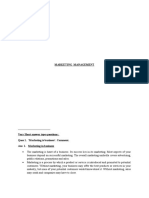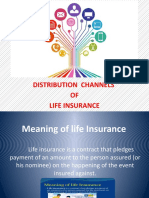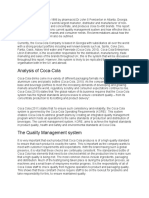0 ratings0% found this document useful (0 votes)
501 viewsShort Answer Questions / 2 Mark Question With Answers: Marketing Management
Short Answer Questions / 2 Mark Question With Answers: Marketing Management
Uploaded by
mba deptThis document contains 27 short marketing questions and answers. It defines key marketing terms like promotion, branding, market segmentation, green marketing, product mix, brand rejuvenation, marketing management, and Maslow's hierarchy of needs. It also explains concepts such as convenience goods, mark-up pricing, personal selling, market penetration strategy, psychographic segmentation, perfect markets, supply chains, e-tailing, hypermarkets, and comparative advertising. The questions cover a wide range of fundamental marketing topics.
Copyright:
© All Rights Reserved
Available Formats
Download as PDF, TXT or read online from Scribd
Short Answer Questions / 2 Mark Question With Answers: Marketing Management
Short Answer Questions / 2 Mark Question With Answers: Marketing Management
Uploaded by
mba dept0 ratings0% found this document useful (0 votes)
501 views5 pagesThis document contains 27 short marketing questions and answers. It defines key marketing terms like promotion, branding, market segmentation, green marketing, product mix, brand rejuvenation, marketing management, and Maslow's hierarchy of needs. It also explains concepts such as convenience goods, mark-up pricing, personal selling, market penetration strategy, psychographic segmentation, perfect markets, supply chains, e-tailing, hypermarkets, and comparative advertising. The questions cover a wide range of fundamental marketing topics.
Original Title
Marketing-management 2 Mark Notes
Copyright
© © All Rights Reserved
Available Formats
PDF, TXT or read online from Scribd
Share this document
Did you find this document useful?
Is this content inappropriate?
This document contains 27 short marketing questions and answers. It defines key marketing terms like promotion, branding, market segmentation, green marketing, product mix, brand rejuvenation, marketing management, and Maslow's hierarchy of needs. It also explains concepts such as convenience goods, mark-up pricing, personal selling, market penetration strategy, psychographic segmentation, perfect markets, supply chains, e-tailing, hypermarkets, and comparative advertising. The questions cover a wide range of fundamental marketing topics.
Copyright:
© All Rights Reserved
Available Formats
Download as PDF, TXT or read online from Scribd
Download as pdf or txt
0 ratings0% found this document useful (0 votes)
501 views5 pagesShort Answer Questions / 2 Mark Question With Answers: Marketing Management
Short Answer Questions / 2 Mark Question With Answers: Marketing Management
Uploaded by
mba deptThis document contains 27 short marketing questions and answers. It defines key marketing terms like promotion, branding, market segmentation, green marketing, product mix, brand rejuvenation, marketing management, and Maslow's hierarchy of needs. It also explains concepts such as convenience goods, mark-up pricing, personal selling, market penetration strategy, psychographic segmentation, perfect markets, supply chains, e-tailing, hypermarkets, and comparative advertising. The questions cover a wide range of fundamental marketing topics.
Copyright:
© All Rights Reserved
Available Formats
Download as PDF, TXT or read online from Scribd
Download as pdf or txt
You are on page 1of 5
MARKETING MANAGEMENT
For B.com/BBA, Calicut University
SHORT ANSWER QUESTIONS / 2 MARK
QUESTION WITH ANSWERS
1. Define marketing? composed of consumers who will respond
According to Philip Kotler, Marketing is the set of similarly to marketing strategies and who
human activities directed at facilitating and share traits such as similar interests, needs,
consummating exchanges. or locations.
The American Marketing association defines 5. What is consumer good?
marketing as the activity, set of institutions, Consumer goods are products that are
and processes for creating, communicating, purchased for consumption by the
delivering, and exchanging offerings that average consumer. Alternatively called
have value for customers, clients, partners, final goods, consumer goods are the end
and society at large. result of production and manufacturing and
2. What is meant by promotion? are what a consumer will see on the store
Promotion refers to any type shelf. Clothing, food and jewelry are all
of marketing communication used to inform examples of consumer goods.
or persuade target audiences of the relative 6. Define packaging?
merits of a product, service, brand or issue. Packaging refers to the activities of
... It is one of the basic elements of the wrapping or enclosing the production in a
market mix, which includes the four P's: container like bottle, tin, jar, bag etc. to
price, product, promotion, and place. facilitate transportation, storage and sale.
3. What do you mean by branding? 7. What do you mean by skimming price
The process involved in creating a unique policy?
name and image for a product in the Price skimming is a pricing strategy in
consumers' mind, mainly through which a marketer sets a relatively high
advertising campaigns with a consistent initial price for a product or service at first,
theme. Branding aims to establish a and then lowers the price over time.
significant and differentiated presence in the 8. What is e-commerce?
market that attracts and retains loyal E-commerce refers to any form of business
customers.. transaction conducted online. The most
4. What is market segmentation? popular example of e-commerce is online
Market segmentation is the process of shopping, which is defined as buying and
dividing a market of potential customers into selling of goods via the internet on any
groups, or segments, based on different device. However, e-commerce can also
characteristics. The segments created are entail other types of activities, such as online
auctions, payment gateways, online confidence, competence, achievement and
ticketing, and internet banking. freedom) and external esteem needs
9. What is meant by green marketing? (recognition, power, status, attention and
Green marketing products that are presumed admiration).
to be environmentally safe. It incorporates a e) Self-actualization need- This include the
broad range of activities, including product urge to become what you are capable of
modification, changes to the production becoming / what you have the potential to
process, sustainable packaging, as well as become. It includes the need for growth and
modifying advertising. self-contentment. It also includes desire for
10. What is product mix? gaining more knowledge, social- service,
Product Mix in Marketing. Product mix, also creativity and being aesthetic. The self-
known as product assortment, is the total actualization needs are never fully satiable.
number of product lines that a company As an individual grows psychologically,
offers to its customers. The product lines opportunities keep cropping up to continue
may range from one to many and the growing.
company may have many products under the
same product line as well. 14. What are convenience goods?
11. Bring out the concept of brand rejuvenation? A convenience good is a consumer item that
Brand Rejuvenation is the process of is widely available and purchased frequently
changing the 'look and feel' of your brand with minimal effort. ... Convenience goods,
while leaving the brand/business foundations such as newspapers and candy,
relatively untouched. 15. What is mark up pricing?
12. Define marketing management? The mark-up pricing is the method of adding
The American Association of Marketing a certain percentage of a mark-up to the cost
define marketing management as the process of the product to determine the selling price.
of planning and executing the conception, In order to apply the mark-up pricing, firstly,
pricing, promotion and distribution of ideas, the companies must determine the cost of a
goods and services in order to create, product and decide on the amount of profit
exchange and satisfy individual and to be earned over and above it and then add
organisational objectives that much mark-up in the cost.
13. Explain Maslow’s theories of motivation? 16. Define personal selling?
Abraham Maslow is well renowned for Personal selling can be defined as "the
proposing the Hierarchy of Needs Theory in process of person-to-person communication
1943. This theory is a classical depiction of between a salesperson and a prospective
human motivation. This theory is based on customer, in which the former learns about
the assumption that there is a hierarchy of the customer's needs and seeks to satisfy
five needs within each individual. The those needs by offering the customer the
urgency of these needs varies. These five opportunity to buy something of value, such
needs are as follows- as a good or service.
a) Physiological needs- These are the basic 17. What is market penetration strategy?
needs of air, water, food, clothing and Market penetration is a measure of the
shelter. In other words, physiological needs amount of sales or adoption of a product or
are the needs for basic amenities of life. service compared to the total
b) Safety needs- Safety needs include theoretical market for that product or
physical, environmental and emotional service. A market penetration strategy
safety and protection. For instance- Job involves focusing on selling existing
security, financial security, protection from products or services into existing markets to
animals, family security, health security, etc. gain a higher market share.
c) Social needs- Social needs include the 18. What is psychographic segmentation?
need for love, affection, care, belongingness, Psychographic segmentation involves
and friendship. dividing your market into segments based
d) Esteem needs- Esteem needs are of two upon different personality traits, values,
types: internal esteem needs (self- respect,
attitudes, interests, and lifestyles of brand equity is the value built-up in a brand.
consumers. 26. What is meant by hypermarket?
19. What is perfect market? Hypermarkets are large retail establishments
A market in which buyers and sellers have
that are a combination of supermarket and
complete information about a particular
product and it is easy to compare prices of department stores. They are considered as a
products because they are the same as each one-stop shop for all of the customer’s
other etc. needs. Hypermarkets basically have all the
20. The supply chain is the chain of suppliers merchandise that could be required by a
that an organization relies on to produce person on a daily basis.
marketing materials (print, promotional 27. What do you mean by comparative
products and point of sale) to market their
advertising?
products and services.
21. What is e-tailing? Comparative advertising is a marketing
Electronic retailing is the sale of goods and strategy in which a company's product or
services through the service is presented as superior when
internet. Electronic retailing, or e-tailing, can compared to a competitor's. A comparative
include business-to-business (B2B) and advertising campaign may involve printing a
business-to-consumer (B2C) sales of side-by-side comparison of the features of a
products and services, through subscriptions
company's products next to those of its
to website content, or through advertising.
22. What is promotion mix? competitor.
The promotional mix is one of the 4 Ps of 28. What is meant by niche marketing?
the marketing mix. It consists of public Niche marketing is defined as channeling all
relations, advertising, sales promotion and marketing efforts towards one well-defined
personal selling. The Promotion Mix is the segment of the population. There is one
integration of Advertising, Personal Selling, important thing to understand that ‘niche’
Sales Promotion, Public Relations and does not exist, but is created by smart
Direct Marketing. marketing techniques and identifying what
the customer wants.
23. What is test marketing? 29. What is meant by internet marketing?
Test marketing is a marketing method that Internet marketing is the process of
aims to explore consumer response to a promoting a business or brand and its
product or marketing campaign by making it products or services over the internet using
available on a limited basis before a wider tools that help drive traffic, leads, and sales.
release. 30. Define consumer behaviour?
24. What is penetration pricing? Consumer behavior is the process whereby
Penetration pricing is a marketing strategy individuals decide what, when, where, how
used by businesses to attract customers to a and from whom to purchase goods and
new product or service. Penetration pricing services”.
includes offering a low price for a new 31. What is product life cycle?
product or service during its initial offering. Product’s life begins with its market
The lower price helps to lure customers introduction, then goes through a period
away from competitors. during which its market grows rapidly,
25. What is brand equity? eventually it reaches at maturity and then
Brand equity simply refers to value stands saturated. Afterwards, its market
associated with a brand. It is the value declines and finally its life come to an end.
inherent in a well-known brand name. It is Thus a product passes through different
the marketing and financial value associated stages. The stages through which a product
with a brand’s strength in a market. In short,
passes are collectively known as product life 37. Give two differences between marketing and
cycle. selling?
32. Explain the meaning of labelling? The selling concept focuses on the needs of
Labelling is an integral part of packaging. It the seller while the marketing concept
gives verbal information about the product focuses on the needs of the buyer. The
and the seller. It serves to identify a brand. selling concept works to turn products into
Thus the purpose of labelling is to give the cash while the marketing concept works to
consumer information about the product he satisfy the customers' needs through the
is buying and what it will and will not do for product.
him. It is the display of important 38. How is modern marketing concept differing
information on a product package. It from traditional concept?
contains name of producer, name of product, Traditional marketing focused on selling the
qualities of product, quantity of product, products which were produced by the
ingredients, ate of production, expiry date, company whereas modern marketing first
instructions for use and storage. looks at from customer satisfaction point of
33. Define advertising? view and then produce the product according
Advertising is an audio or visual form of to needs of the customers subsequently
marketing communication that employs an selling those goods to target customers.
openly sponsored, non-personal message to traditional market used to think from
promote or sell a product, service or idea. company’s point of view as their whole
34. What is meant by relationship marketing? focus was on selling the goods to the
The Relationship Marketing refers to the customer no matter whether they required
activities undertaken by the firm to establish the goods or not. Whereas modern
and maintain the profitability and the long- marketing is customer oriented as under this
term relationship with the customers. type of marketing company first assesses the
35. What is mail order business? need of the customer and then the product is
Mail-order business, also called direct-mail customized to suit the customer needs.
marketing, method of merchandising in 39. What is product positioning?
which the seller’s offer is made through Product positioning is a form of marketing
mass mailing of a circular or catalog or that presents the benefits of your product to
through an advertisement placed in a a particular target audience. Product
newspaper or magazine and in which the positioning is the process marketers use to
buyer places an order by mail. Delivery of determine how to best communicate their
the goods may be made by freight, express, products' attributes to their target customers
or parcel post on a cash-on-delivery basis. based on customer needs, competitive
Retail mail-order selling was developed pressures, available communication channels
primarily for rural customers, but it now and carefully crafted key messages.
includes millions of customers in urban 40. What do you mean by shopping product and
areas. specialty product?
36. What is brand loyalty? A shopping product is a type of product that
Brand loyalty is the tendency of consumers requires consumer research and comparison
to continuously purchase one brand's of brands. A specialty product is
products over another. Consumer behavior a product that certain consumers will
patterns demonstrate that consumers will actively seek to purchase because of unique
continue to buy products from a company characteristics or loyalty to a specific brand.
that has fostered a trusting relationship. 41. What is demographic segmentation?
Democratic segmentation is sell your products once the potential
market segmentation according to age, race, customer is in the business. The term
religion, gender, family size, ethnicity, merchandising is derived from the term
income, and education. merchant. Merchandising simply refers to
42. What is sales promotion? product planning. It aims at internal
Sales promotion is the process of persuading planning relating to products or services for
a potential customer to buy the marketing at the right time, at right price and
product. Sales promotion is designed to be in proper colour, qualities and sizes.
used as a short-term tactic to boost sales 49. What is target return pricing?
43. What is target marketing? The Target-Return Pricing is a method
Target marketing (or targeting) is the wherein the firm determines the price on the
process of assessing the relative worth of basis of a target rate of return on the
different market segments and selecting one investment i.e. what the firm expects...
or more segments in which to compete. 50. What is post purchase dissonance?
These become the target segments. Post purchase behaviour refers to the
44. What is product line? behaviour of a consumer after purchasing a
A product line is a group of related products product. After the consumer has actually
under a single brand sold by the same purchased the product/brand he will be
company. Companies sell multiple product satisfied or dissatisfied with it. This
lines under their various brands. Companies satisfaction or dissatisfaction will result in
often expand their offerings by adding to certain consequences. If he is dissatisfied
existing product lines, because consumers with the product he may stop buying more
are more likely to purchase products products of that brand and may also spread
from brands with which they are already bad words about the brand (negative word of
familiar. mouth). He feels mental tension also. This
45. What is retailing? negative feeling which arises after purchase
Retailing is a distribution channel function causing inner tension is known as cognitive
where one organization buys products from dissonance (or post purchase dissonance).
supplying firms or manufactures the product 51. What do you mean by price bundling?
themselves, and then sells these directly to Price bundling is a strategy whereby a seller
consumers. A retailer is a reseller (i.e., bundles together many different goods/items
obtains product from one party in order to being sold and offers the entire bundle at a
sell to another) from which a consumer single price.
purchases products.
46. What is social marketing?
Social marketing is an approach used to
develop activities aimed at changing or
maintaining people's behaviour for the
benefit of individuals and society as a whole.
47. What is consumerism?
Consumerism is a social and economic order
that is based on the systematic creation and
fostering of a desire to purchase goods or
services in ever greater amounts.
48. what is merchandising?
Merchandising is everything to promote and
You might also like
- OP-COM Fuel Consumption CorrectionDocument5 pagesOP-COM Fuel Consumption Correctionsport190196667% (3)
- Unit 5 - Rural DistributionDocument47 pagesUnit 5 - Rural DistributionAnurag ZullurwarNo ratings yet
- 2011fortblissdirect EeditionDocument148 pages2011fortblissdirect Eeditionbigjohnny100% (1)
- Evolution of Business OrganisationDocument14 pagesEvolution of Business Organisationk.singh08082003No ratings yet
- Solved Question Paper 2019-Managerial EconomicsDocument34 pagesSolved Question Paper 2019-Managerial EconomicsSheetal ShettyNo ratings yet
- Marketing Management Notes For All 5 Units PDFDocument133 pagesMarketing Management Notes For All 5 Units PDFPrabhamohanraj MohanrajNo ratings yet
- Unit 5 EtgbeDocument38 pagesUnit 5 Etgbebikramjee321No ratings yet
- Mba-Mk4 2023Document6 pagesMba-Mk4 2023Lalit SinghNo ratings yet
- Rural Management - Case Study-2Document3 pagesRural Management - Case Study-2Himang Pathak100% (1)
- Consumer As An IndividualDocument31 pagesConsumer As An Individualanon_238291910No ratings yet
- Unit-V Laws Concerning Entrepreneur Viz, Partnership LawsDocument34 pagesUnit-V Laws Concerning Entrepreneur Viz, Partnership LawsPiyush ChaurasiaNo ratings yet
- Q - 5 Changing Role of Bank in IndiaDocument3 pagesQ - 5 Changing Role of Bank in IndiaMAHENDRA SHIVAJI DHENAKNo ratings yet
- Unit I - Introductions To RetailingDocument35 pagesUnit I - Introductions To Retailingjeganrajraj100% (1)
- Nature and Scope of Advertisiing ResearchDocument20 pagesNature and Scope of Advertisiing Researchsilkymahajan75% (4)
- Challenges in Rural CommunicationDocument6 pagesChallenges in Rural Communicationgunashekar gouthamNo ratings yet
- Role of Monetary and Fiscal PDFDocument15 pagesRole of Monetary and Fiscal PDFVinay Kumar KumarNo ratings yet
- Pom - Inventory ManagementDocument5 pagesPom - Inventory ManagementMURALI KRISHNA VELAVETI Dr.No ratings yet
- Definition of BrandingDocument7 pagesDefinition of BrandingtekleyNo ratings yet
- Mcom Applied Syllabus of LUDocument23 pagesMcom Applied Syllabus of LUAmaan RizwanNo ratings yet
- Market Segmentation NotesDocument9 pagesMarket Segmentation Notesarfi0000No ratings yet
- QT Iii Iv Sem PDFDocument17 pagesQT Iii Iv Sem PDFdil. 1122100% (1)
- Introduction To B2B MarketingDocument24 pagesIntroduction To B2B MarketingPurva RathiNo ratings yet
- Marketing Management Question Bank 2Document28 pagesMarketing Management Question Bank 2jatinder99No ratings yet
- Unit-4 - EntrepreneurshipDocument43 pagesUnit-4 - EntrepreneurshipakashNo ratings yet
- Additional English: 1. Discuss The Relevance of Gandhi As An Icon TodayDocument3 pagesAdditional English: 1. Discuss The Relevance of Gandhi As An Icon TodaySaumya SinghNo ratings yet
- A Study of Audience Perception About The PDFDocument12 pagesA Study of Audience Perception About The PDFRahat HaneefNo ratings yet
- Features of Economic PlanningDocument11 pagesFeatures of Economic PlanningParshotam SinghNo ratings yet
- Industrial Relations (KCP Cement) 2017Document80 pagesIndustrial Relations (KCP Cement) 2017krishnarao kalidasuNo ratings yet
- Case LawsDocument10 pagesCase LawsAbhishek JainNo ratings yet
- Karate KidDocument7 pagesKarate Kidtrinath ojhaNo ratings yet
- Opinion LeadershipDocument7 pagesOpinion LeadershipAnand SinghNo ratings yet
- Bcom 3 Sem Quantitative TechniquesDocument3 pagesBcom 3 Sem Quantitative TechniquesManaveNo ratings yet
- Dsmnru Bba SyllabusDocument42 pagesDsmnru Bba SyllabusSatyam SinghNo ratings yet
- Organizational Culture, Conflict and EffectivenessDocument24 pagesOrganizational Culture, Conflict and Effectivenessakash100% (1)
- Consumer Behaviour: An IntroductionDocument29 pagesConsumer Behaviour: An IntroductionSaralitaNo ratings yet
- Analysis Factor Analysis Cluster AnalysisDocument18 pagesAnalysis Factor Analysis Cluster AnalysisNagunuri SrinivasNo ratings yet
- Creativity and InnovationDocument8 pagesCreativity and InnovationAnnisa Putri OctavianiNo ratings yet
- Political Environment NewDocument30 pagesPolitical Environment NewVinay JangraNo ratings yet
- Business EnvironmentDocument17 pagesBusiness EnvironmentDrShailesh Singh Thakur100% (1)
- SCBADocument31 pagesSCBAraggarwal101No ratings yet
- Indian Ethos and Business EthicsjsjhdsDocument2 pagesIndian Ethos and Business EthicsjsjhdsUnique MNNo ratings yet
- Chapter 1 NotesDocument7 pagesChapter 1 NotesJesse JhangraNo ratings yet
- Channel Designing DecisionDocument3 pagesChannel Designing DecisionDivya Singh100% (1)
- Clearance or Permission For Establishing Industries: Prepared By:-Pankaj Preet SinghDocument22 pagesClearance or Permission For Establishing Industries: Prepared By:-Pankaj Preet SinghpreetsinghjjjNo ratings yet
- Unit 5 Social Cultural Environment - PDF 5Document6 pagesUnit 5 Social Cultural Environment - PDF 5Nayan KcNo ratings yet
- Topic 5 FORMS OF ORGANIZATIONAL STRUCTURE PDFDocument15 pagesTopic 5 FORMS OF ORGANIZATIONAL STRUCTURE PDFlolipopzeeNo ratings yet
- Student NovelistDocument7 pagesStudent NovelistHardik MadanNo ratings yet
- Matrix of Vedantic Philosophy and Wisdom in AidDocument25 pagesMatrix of Vedantic Philosophy and Wisdom in Aidsrishti bhateja100% (1)
- ED Module 2Document28 pagesED Module 2ನಂದನ್ ಎಂ ಗೌಡNo ratings yet
- Consumer BehaviourDocument22 pagesConsumer Behaviouryai giniNo ratings yet
- Planning in IndiaDocument9 pagesPlanning in Indiajustinphilip2009No ratings yet
- A Study On Consumer Perception Towards Multiplex Theatre - With Special Reference To Coimbatore CityDocument4 pagesA Study On Consumer Perception Towards Multiplex Theatre - With Special Reference To Coimbatore Cityabhishek jamwalNo ratings yet
- Rural Marketing EnvironmentDocument16 pagesRural Marketing Environmentaparna kallaNo ratings yet
- Distribution Channel of LICDocument9 pagesDistribution Channel of LICmanish yadavNo ratings yet
- Advert Copy and Layout PDFDocument15 pagesAdvert Copy and Layout PDFAbdulgafar OpeyemiNo ratings yet
- Advertising ManagementDocument45 pagesAdvertising Managementtripathi_indramani5185No ratings yet
- FM & R - V Sem - Full ModuleDocument172 pagesFM & R - V Sem - Full ModuleSams VimalNo ratings yet
- Chapter One: Overview of The Marketing ManagementDocument20 pagesChapter One: Overview of The Marketing ManagementgoshuNo ratings yet
- IntroDocument3 pagesIntroShivaniNo ratings yet
- Marketing Management Full Notes Mba PDFDocument268 pagesMarketing Management Full Notes Mba PDFKollol Deb100% (1)
- BA4207 MArketing Management NotesDocument143 pagesBA4207 MArketing Management Notesmuthuselvamcr007No ratings yet
- DR APJ Abdul Kalam Launches Window To The World' A Unique CSR Project by Bilcare FoundationDocument2 pagesDR APJ Abdul Kalam Launches Window To The World' A Unique CSR Project by Bilcare FoundationtanyamamNo ratings yet
- Machines+Archimedes' PrincipleDocument28 pagesMachines+Archimedes' PrincipleLei LavinaNo ratings yet
- Resume For Student Visa ApplicationDocument5 pagesResume For Student Visa Applicationfdgwmljbf100% (2)
- Buffer Overflow Vulnerability Lab: The BUF SIZE Value For This Lab IsDocument12 pagesBuffer Overflow Vulnerability Lab: The BUF SIZE Value For This Lab IsĐuc ĐoanNo ratings yet
- Case StudyDocument7 pagesCase StudyAjay GahlawatNo ratings yet
- KISTLER Smotion SensorDocument3 pagesKISTLER Smotion Sensoriralex-1No ratings yet
- Republic Act No. 9009: Repealing ClauseDocument1 pageRepublic Act No. 9009: Repealing ClauseJudy Ann ShengNo ratings yet
- MT860 AngDocument2 pagesMT860 AngGuson KuntartoNo ratings yet
- Chap14 Dividend Payout PolicyDocument62 pagesChap14 Dividend Payout PolicyBaby KhorNo ratings yet
- Invoice S10000003956Document1 pageInvoice S10000003956ichihara budiNo ratings yet
- Highway Design and RailwayDocument17 pagesHighway Design and RailwayAnousack KittilathNo ratings yet
- Bakker Et Al - 2022 - Noticing As Reasoning in Lesson Study Teams in Initial Teacher EducationDocument14 pagesBakker Et Al - 2022 - Noticing As Reasoning in Lesson Study Teams in Initial Teacher Educationlingkar pena indonesiaNo ratings yet
- Lecture 1-Review-Binary - Logic-BasicsDocument34 pagesLecture 1-Review-Binary - Logic-BasicsHassan ShehadiNo ratings yet
- Cyber Security ReportDocument24 pagesCyber Security ReportAakash Jain50% (2)
- Factorial DesignDocument29 pagesFactorial Designahmed elkhouly100% (1)
- Analysis of Coca-ColaDocument6 pagesAnalysis of Coca-ColaAndreea CiureaNo ratings yet
- BE Engineering Guide B 50 Model ENG15072 YLAA Scroll Chillers PDFDocument58 pagesBE Engineering Guide B 50 Model ENG15072 YLAA Scroll Chillers PDFMegaHyperMaxNo ratings yet
- Pp704-Sec-f07 CCC Security ChecklistDocument5 pagesPp704-Sec-f07 CCC Security ChecklistMohamed MounerNo ratings yet
- BTC - Autopilot - Method - MAKE - 700$-800$ - PER - WEEKDocument4 pagesBTC - Autopilot - Method - MAKE - 700$-800$ - PER - WEEKAnubis JoseNo ratings yet
- Zero Energy BuildingDocument13 pagesZero Energy BuildingAkshay V SukumaranNo ratings yet
- Ge3451 - EssDocument4 pagesGe3451 - EssOhmsakthi vel R100% (1)
- Alienated Land (Information) ActDocument1 pageAlienated Land (Information) ActAwes SewsaNo ratings yet
- RCPA Schedule of Fees 2024Document3 pagesRCPA Schedule of Fees 2024Omer AltafNo ratings yet
- Fixture Unit CalculatorDocument14 pagesFixture Unit Calculatorاحمد الجزار2007No ratings yet
- Chapter 1: Project Introduction 1.1 The ProjectDocument5 pagesChapter 1: Project Introduction 1.1 The ProjectGeanno PolinagNo ratings yet
- El Gawley, Nadyat at Al.Document6 pagesEl Gawley, Nadyat at Al.ΦΙΛΑΡΕΤΗ ΚΑΡΚΑΛΙΑNo ratings yet
- Nickel: 1 - (2 Pyridylazo) - 2-Napthol (PAN) Method Method 8150 0.006 To 1.000 MG/L Ni Powder PillowsDocument6 pagesNickel: 1 - (2 Pyridylazo) - 2-Napthol (PAN) Method Method 8150 0.006 To 1.000 MG/L Ni Powder PillowsIsaac FlorenciaNo ratings yet
- Corporate Social Responsibility of Brac BankDocument8 pagesCorporate Social Responsibility of Brac BankRashedul HasanNo ratings yet

























































































